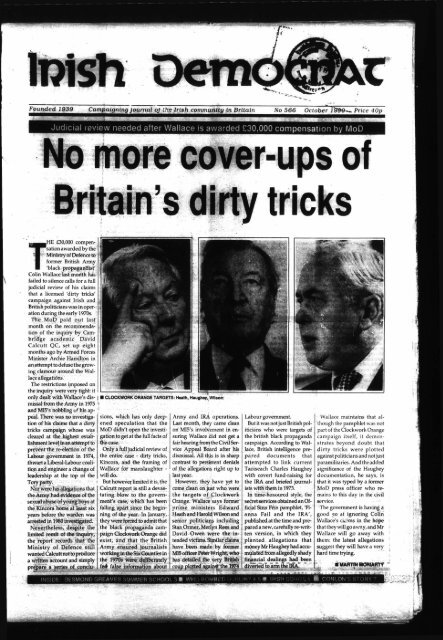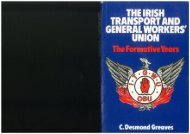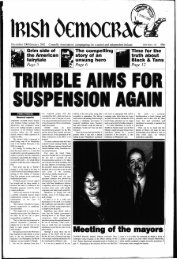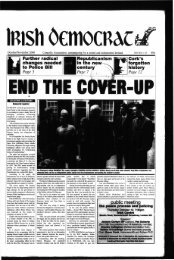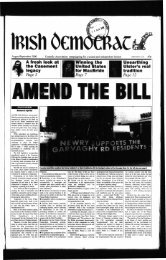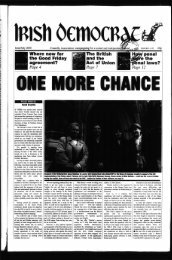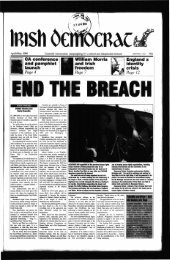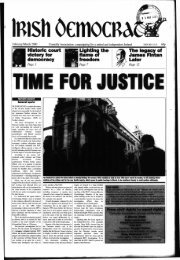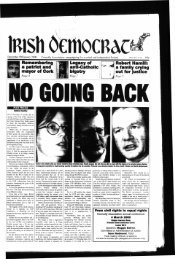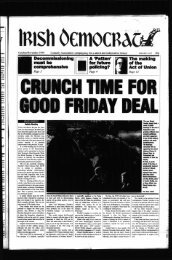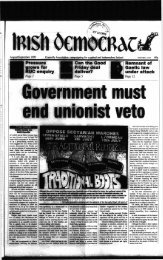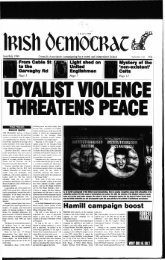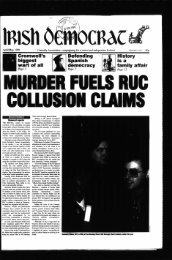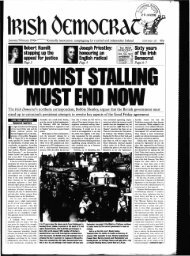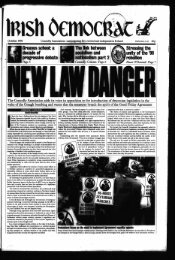Irish Democrat October 1990
You also want an ePaper? Increase the reach of your titles
YUMPU automatically turns print PDFs into web optimized ePapers that Google loves.
Founded 1939 Campaigning journal of the <strong>Irish</strong> community in Britain No 566 <strong>October</strong> Price 40p<br />
judicial review needed after Wallace is awarded £30,000 compensation by MoD<br />
Labour government.<br />
But it was not just British politicians<br />
who were targets of<br />
the british black propaganda<br />
campaign. According to Wallace,<br />
British intelligence prepared<br />
documents that<br />
attempted to link current<br />
Taoiseach Charles Haughey<br />
with covert fund-raising for<br />
the IRA and briefed journalists<br />
with them in 1973.<br />
In time-honoured style, the<br />
secret services obtained an Official<br />
Sinn F£in pamphlet, 'Fianna<br />
Fail and the IRA',<br />
published at the time and prepared<br />
a new, carefully re-written<br />
version, in which they<br />
planted allegations that<br />
money Mr Haughey had accumulated<br />
from allegedly shady<br />
financial dealings had been<br />
» mi T/r» . - «a» »•• rdt><br />
diverted to arm the IRA.<br />
Wallace maintains that although<br />
the pamphlet was not<br />
part of the Clockwork Orange<br />
campaign itself, it demonstrates<br />
beyond doubt that<br />
dirty tricks were plotted<br />
against politicians and not just<br />
paramilitaries. And the added<br />
significance of the Haughey<br />
documentation, he says, is<br />
that it was typed by a former<br />
MoD press officer who remains<br />
to this day in the civil<br />
service.<br />
The government is having a<br />
good 50 at ignoring Colin<br />
Wallace's ckims in the hope<br />
that they will go away, and Mr<br />
Wallace will go away with<br />
them: the latest allegations<br />
suggest they will have a very<br />
hard time trying.<br />
DE<br />
DESMOND GREAVES<br />
HOOi. 3 m WI-
NEWS<br />
i*<br />
E D I T O R I A L ..<br />
Another step<br />
nearer freedom<br />
Top speakers lined up for CA<br />
trade union seminar<br />
Anti-national revisionism in Ireland is just one aspect of a global phenomenon<br />
THERE HAVE BEEN false dawns before, hopes for<br />
justice raised only to be dashed down, but with the<br />
current disarray within the police and judiciary<br />
over the referral back to the Court of Appeal of the<br />
Birmingham pub bombings case, it is devoutly to be<br />
wished that the six men who have between them spent<br />
a total of 96 years in jail for a crime they didn't commit<br />
will soon be able to walk free.<br />
But the outcome of the hearing, whenever it is heard,<br />
is by no means a foregone conclusion yet: it is difficult<br />
to be confident when there are so many reputations at<br />
stake, not least that of the Lord Chief Justice, Lord Lane.<br />
Lane it was, it will be remembered, who dismissed the<br />
men's last appeal in January J988 with such contempt. , r<br />
The court had seen the comprehensive demolition of<br />
the forensic evidence, had heard fresh evidence of the<br />
use of torture to extract confessions, had, indeed, witnessed<br />
a police woman return to the stand to admit perjuring<br />
herself under pressure, but Lord Lane<br />
maintained that the longer the appeal had continued,<br />
the more convinced he had become of the Crown's case.<br />
Lane's mind isn't just closed on the case: he has<br />
locked the door and thrown away the key. For that reason,<br />
he can have no business hearing the men's appeal:<br />
he will just have to stand down.<br />
Of course, there may be no hearing at all: the establishment<br />
might choose to 'do a Guildford' and not contest<br />
the appeal. But however glum the West Midlands<br />
are reported to be, whatever difficulties the referral mat<br />
be causing senior members of the judiciary, this is no<br />
time for inaction. Quite the reverse. Sustained political<br />
pressure has got the Birmingham Six one step nearer<br />
freedom: maintenance of the momentum can only help<br />
ensure a just outcome.<br />
Whether or not the appeal is contested, whenever a<br />
hearing is set, whoever presides, there will remain the<br />
question of how it happened in the first place. And in<br />
this regard, one piece of legislation forever associated<br />
with the Birmingham pub bombings can have no future<br />
on the statute books. Calls for the replacement of the adversarial<br />
judicial system with magisterial investigation<br />
are indeed valid enough, but much more urgent remains<br />
the repeal of the PTA.<br />
MM<br />
IRISH DEMOCRAT: journal of the Connolly Association<br />
EDITORIAL BOARD: Gerard Curran, Conor Foley<br />
(news), Martin Moriarty (production), Peter Mulligan<br />
PUBLISHED BY: Connolly Publications Ltd., 244-46<br />
Gray's Inn Road, London WC1 8JX. Tel: 071-833 3022<br />
Join the CA!<br />
If you want to join the campaign for <strong>Irish</strong> unity and independence,<br />
then join the Connolly Association. Only the Connolly Association<br />
has got the staying power, the Ideas and the Influence the campaign<br />
needs.<br />
Membership costs a mere £8 a year (£10 for couples and £4 for<br />
students, unemployed and pensioners) and includes a free subscription<br />
to the <strong>Irish</strong> <strong>Democrat</strong><br />
NAME<br />
ADDRESS<br />
j<br />
'<br />
MANY CONGRATULATIONS on<br />
the September <strong>Irish</strong> <strong>Democrat</strong> article<br />
dealing with the Construction Safety<br />
Campaign fight against the growing<br />
number of deaths occurring on sites<br />
up and down the country. It is to be<br />
hoped the CSC goes from strength to<br />
strength in its work to prevent these<br />
unnecessary dea ths.<br />
We would like, however, to draw ,<br />
your readers'attention to other prob- i<br />
lems that workers face at work,<br />
namely the chronic diseases that develop<br />
over the yearsand lead to workers<br />
dying early or having to retire<br />
through work-related ill-health.<br />
For the past 12 years, the Sheffield<br />
Occupational Health Project has<br />
talked to thousands of workers about<br />
their working conditions and the effects<br />
they have on them. This has<br />
included <strong>Irish</strong> workers whose jobs<br />
have been in the 'traditional' areas -<br />
building sites, mains laying, civil engineering<br />
- and smaller numbers in<br />
Sheffield steel and engineering<br />
plants. Also included have been <strong>Irish</strong><br />
women who in the main have<br />
worked in the NHS.<br />
Results from our interviews show<br />
evidence of high levels of industrial<br />
disease that cover a wide range of<br />
problems, including lung disease, industrial<br />
deafness and tinnitus, vibration-induced<br />
whitefinger, dermatitis<br />
and strain injuries. The biggest problems<br />
with these injuries - apart from<br />
some of the more obvious ones like<br />
dermatitis - is their insidious nature.<br />
They often develop over a number of<br />
years and are nearly always associated<br />
with age. 'I'm getting old', 'I've<br />
got rheumatics', 'I've got arthritis'<br />
are workers' common descriptions of<br />
illness, and when these symptoms<br />
are related to their GPs - who in the<br />
main have very little knowledge of<br />
industrial disease - misdiagnosis<br />
often occurs. This leads to workers<br />
being denied proper benefits and<br />
often hinders claims for damages.<br />
More serious than this, however, is<br />
that because of misdiagnosis, the<br />
high incidence of work-related illhealth<br />
is not documented sufficiently<br />
CLARE SHORT MP (left), <strong>Irish</strong> Labour<br />
TD Emmet Stagg and Kevin<br />
McNamara, the British Labour<br />
Party's frontbench spokesperson<br />
on Northern Ireland, wHI ail<br />
be speaking at next month'strode<br />
union seminar, '<strong>Irish</strong> unity:<br />
strategies for consent', organised<br />
by the Connolly Association.<br />
They will be joined by, among<br />
others, Sean Redmond, the leading<br />
member of Dublin4>ased<br />
Trade Unionists for an Independent<br />
and United Ireland, and<br />
Kevin McCorry, convenor of the<br />
Belfast-based Campaign for<br />
Democracy.<br />
The seminar has already attracted<br />
substantial interest and a<br />
LETTERS TO THE EDITOR<br />
and allows for the situation to continue<br />
from one generation to another.<br />
If any readers want to know more,<br />
they can contacts us at Sheffield Occupational<br />
Health Project, Mudford<br />
Buildings, 37 Exchange Street, Sheffield<br />
S2 5TR. Tel: 0742-755760.<br />
Sheffield Occupational<br />
Health Project<br />
Gulf crisis<br />
POLITICUS'S ARTICLE in September's<br />
<strong>Democrat</strong> on the Gulf crisis<br />
mates the mistake of simply backing<br />
the forces that are fighting imperialism<br />
while ignoring their methods.<br />
Peace cannot be maintained if the<br />
anti-imperialist forces ignore international<br />
law when they want to invade<br />
a country to prop up a friendly<br />
government or to topple a reactionary<br />
regime and only support international<br />
law when it is broken by the<br />
imperialists. We will get nowhere by<br />
mirroring the methods of imperialism.<br />
Nor should we follow in imperialism's<br />
wake only to be let down<br />
when it decides that international<br />
law does not meet its own interests.<br />
Any solution to the current conflict<br />
should help to lay the basis for a progressive<br />
solution to all such conflicts.<br />
The main issue at stake is: how<br />
should territorial disputes be resolved?<br />
And the answer is: through<br />
the mechanisms of the United Nations.<br />
The UN Charter provides the best<br />
framework for the peaceful resolution<br />
of such disputes. It is in the longterm<br />
interests of the forces opposed<br />
to imperialism to strengthen the UN,<br />
which provides, in theory, the structure<br />
for the peaceful resolution of territorial<br />
disputes. The difficulty is in<br />
enforcing UN policies.<br />
If the UN is used as the agency for<br />
the solution of the conflict, then Politicus's<br />
article Is way off the mark.<br />
Iraq's annexation of Kuwait violates<br />
Article 2 of die UN charter which<br />
states: "AO members shall refrain in<br />
their International relations from the<br />
number of trade union organisations<br />
are sponsoring the event,<br />
from local government union<br />
NALGO's north-west district<br />
council to several trades councils<br />
and a number of trade onion<br />
branches.<br />
No trade union activist keen to<br />
develop the discussion about<br />
how Britain could leave Ireland<br />
can afford not to be at the seminar.<br />
Delegate fees are £5, and sponsoring<br />
the seminar costs a trades<br />
counell £10 and a trade union<br />
branch £20. Details tram: Trade<br />
union seminar, Connolly Association,<br />
244-246 Gray's Inn Road,<br />
London WC1X 8JX. Tel: 071-833<br />
9368<br />
threat or use of force against the territorial<br />
integrity or political independence<br />
of any state." J.<br />
The UN is quite correct in ap<br />
sanctions against Iraq under J<br />
41 in response to "action with respect<br />
to threats to the peace, breaches of the<br />
peace and acts of aggression". And<br />
the UN could quite correctly apply a<br />
naval blockade under ARtide *2.<br />
However, the Western naval blockade<br />
is illegal. Only the UN security<br />
council can enforce UN decisions.<br />
The US and Britain are protecting<br />
then* oil supplies and support those<br />
UN decisions they agree with and<br />
violate the UN Charter when it gets<br />
in their way. -1<br />
However, the US and British forces -<br />
were legitimately invited into Saudi<br />
Arabia by the legitimate, although<br />
reactionary, regime, under ArticleSl,<br />
which states: "Nothing in the present<br />
charter shall impair the inherent<br />
right of individual or collective selfdefence<br />
if an armed attack occurs<br />
against a member of the United Nations".<br />
While being legitimate, the US ami<br />
British forces in Saudi Arabia are inflaming<br />
the situation. Britain created<br />
the main territorial disputes tn the<br />
Middle Eastandthe US exptoitsdMMi<br />
most now. They are not suitable Instruments<br />
of UN policy for the Gulf<br />
and should leave Saudi Arabia's protection<br />
to Arab forces.<br />
If the Western forces launch an attack<br />
on Kuwait or Iraq they wiH tie<br />
violating the UN Charter in die same<br />
way that Iraq has done. This crisis<br />
should not be solved by war and if<br />
the imperialists launch an attack {he<br />
ending of the war will be the main<br />
issue.<br />
Resurrection of the UN's military<br />
staff committee to control any future<br />
military action would be a positive<br />
step toward stricter control of future<br />
aggression. Strengthening the UN<br />
would constrain imperialism's room<br />
to manoeuvre far morethan It wtfft ><br />
restrict the anti-imperialists.<br />
BrettI<br />
REVISIONIST' history-writing<br />
was a global phenomenon<br />
in the 1970s and 1980s<br />
and that the <strong>Irish</strong> experiencecould<br />
mostusefully be<br />
studied against that backdrop, contended<br />
Dr Declan Kiberd at the Desmond<br />
Greaves Summer School held<br />
in Dublin over the August bank holiday<br />
weekend<br />
Dr Kiberd, who has just been appointed<br />
to English Professorship at<br />
University College Galway, was<br />
speaking on the theme 'Democracy<br />
and Post-Colonial Culture'.<br />
Until the late 1960s, he said, the<br />
Western intelligentsia had offered<br />
generally warm support to anti-colonial<br />
struggles in Algeria, Palestine,<br />
Iran, Vietnam and so on. But in the<br />
following decades, with the emergence<br />
of Aminin Africa, Khomeini in<br />
Iran and Pol Pot in Asia, Hie image of<br />
'freedom-fighter' was replaced by.<br />
that of 'terrorist'. Some post-colonial<br />
regimes were indeed barbaric; others<br />
merely incompetent; but support for<br />
either was equated with 'pro-Soviet<br />
activity.'<br />
So the radical critique of colonialism,<br />
which had been pioneered by<br />
thinkers like Bertrand Russell and<br />
Jian-Paul Sartre, wag replaced by a<br />
newer, more fashionable thesis of<br />
'tite self-inflicted wound'. One of its<br />
major sponsors, V.S. Naipul, argued<br />
for example thatitwasthe underdevelopment<br />
of ego in native religions,<br />
natter than the economic depredations<br />
of colonialism, which accounted<br />
for India's apparent-<br />
*ipperhack exposes ofThird World<br />
• crises, such as Naipul's, proved<br />
popularamong Western intellectuals<br />
^^EVISION, in the academic<br />
fctsense, is the very essence of the<br />
• "historian's craft? Kit the professional<br />
meaning of the word is not<br />
what people have in mind when 'revisionism'<br />
and 'revisionist' are bandied<br />
about so lightly in popular<br />
commentary today: In its popular<br />
sense it is loaded -with political<br />
meaning, and is a term of abuse ap-<br />
Splifd to those who arc reckoned to<br />
have strayed from the 'nationalisf<br />
interpretation of <strong>Irish</strong> history.<br />
So said Professor Donal McCartney,<br />
who teaches modern <strong>Irish</strong> History<br />
at University College Dublin, in<br />
his lecture on 'History Revisions -<br />
^ Good and Bad' to. this year's Desmond<br />
Greaves Weekend Summer<br />
School, thus becoming the first academic<br />
historian from within Ireland<br />
'to align himself with the anti-revi-<br />
- pionist assault of Cambridge's Dr<br />
Brendan Bradshaw (reported in the<br />
<strong>Irish</strong> <strong>Democrat</strong> July <strong>1990</strong>).<br />
. When the Northern problem<br />
erupted, Professor McCartney said, it<br />
was inevitable that the-time-hon-<br />
means Of <strong>Irish</strong> republicanism would<br />
be called into question by some ('re-<br />
who were coming to the conclusion H<br />
that when the British left India (or II<br />
Iran, or southern Ireland ...), things MH<br />
only got worse. By a subtle modula- llM<br />
all remaining British guilt about<br />
the colonial adventure could be ex- ^^H<br />
punged, because one of the talented, j|H<br />
witty natives of the post-colonyhad I<br />
given permission for this, and in the I<br />
modulated eighteenth-century peri- \ J<br />
ods which readers of The Observer H<br />
could recognise and approve.<br />
writers like Salman L&<br />
refused to translate<br />
messy Third chaos well- -<br />
bred prose; and, instead, accuse Nai- I<br />
pul of a fatal willingness to pose<br />
Third world questions in the lan- I<br />
guage of the West. Rushdie would I<br />
see Naipul as an elegant exam- I<br />
passer, performing rationalist tricks<br />
for his masters, but filled deep down IB<br />
self-loathing. IflK |<br />
has accused Oxbridge-trained Indian<br />
historians of working to a similar self B<br />
censoring formula.<br />
The most coruscating critique of • REMEMBERING THE PAST: British trade union leaders failed to deliver significant solidarity with their <strong>Irish</strong><br />
such revisionism in the Third World brothers and sisters during the 1913 Dublin lock-out. This rare picture from the meeting between Dublin strike<br />
has come from writers, not academ- leaders and the British TUC captures just how unimpressed the event left Connolly (far right)<br />
ics. Rushdie's-greatest novel, Midnight's<br />
Children, accuse? India of<br />
producing "a nation of forgetters." munity suffered a similar amnesia, as nated version, because it was radi- undergoing a post-revisionist movement,<br />
led by writers like Rushdie and<br />
The childretfof independence "mis- people forgot "the name and notion cally opposed to the false one that<br />
laid their powers of retention, so that of things" and "sank into an idiocy historians had created and consethey<br />
had become incapabie af judge- that had no past." Everything failed crated in theschoolbooks." Ultimatenings<br />
of such a trend were discern-<br />
Marquez; and in Ireland the beginment,<br />
having forgotten everythingto in consequence-industry was lost in ly, the people of Macondo in the ible. Poems like Kennelly's Cromwell<br />
which they could compare anything<br />
"a quicksand offorgetfulness", and a novel are made to believe that the<br />
•or plays such as Friel's Making History<br />
had restored some sense of the<br />
'that-had happened." Instead,theytry massacre of workers was "disap- Yankee banana company and its true complexity of political protagonists,<br />
to turn themselves into magicians pea'red" in the single phrase 'There hired killers never existed at all.<br />
to the point v. here they could<br />
who concentrate upon the present weren't any dead." In the end only <strong>Irish</strong> people would have no diffi- no longer be recruited by sentimental<br />
"with the monomania &f snails." one honest man in the novel remem- culty spotting native versions of Nai- nationalists, on the one hand, or by<br />
In his novel One Hundred Years- of bers what the facts truly were, pul or in finding analogies in the anti-national propagandists, on the<br />
Solitude, Gabriel Garcia Marquez de- "though, of course, one would have rewriting of our history. Places like other.<br />
scribes how a latin American com- thought that he was telling a halluci- India and Latin-America were now<br />
-tSSsSKsm<br />
visionists') and defended by others<br />
Cantirrevisionist&'). Some of the most<br />
articulate politicians at the centre of<br />
this debate - Garret FitzGerald, John<br />
Hume, and Conor Cruise O'Brien -<br />
were themselves history graduates<br />
and products of what has been called<br />
'the historiographical revolution' in<br />
our universities, and they were<br />
bound to lace their political arguments<br />
with h ; torical allusions.<br />
When profession ll historians rushed<br />
to join the debate revisionism had<br />
come to Ireland with a vengeance.<br />
The 'personality tult' - of Pearse in<br />
particular - came under attack. Romantic<br />
nationalism was "subjected to<br />
much diNichaiisid crjticism. The<br />
1916 Rishtewas portrayed in a colder<br />
light. T>emy thologising' wasapplied<br />
to every aspect of our past. Historica 1<br />
commentators urged our deliverance<br />
from "the false history that had for<br />
too long masqueraded as the real<br />
thing" and theories of nationality<br />
were re-examined. This kind of revisionism<br />
was quite clearly political in<br />
the past is leading usto abandon the<br />
republican tradition and to leave it.<br />
entirely in the hands of the Provisional<br />
IRA. It was in this general slippage<br />
that the once populist de Valera<br />
fell from public favour, and Michael<br />
Collins will no doubt come tumbling<br />
after.<br />
De Valera has been silently set aside<br />
even by Fianna Fciil while the more<br />
prosaic and business-oriented Lemass<br />
has replaced him in an ideological<br />
coup carried out by the present<br />
leaders of the party. The change of<br />
climate in the manner in which we<br />
view our past made it possible to<br />
accept the Anglo-<strong>Irish</strong> agreement<br />
and cooperate more closely on security<br />
matters with the old enemy.<br />
It could also be argued that recent<br />
<strong>Irish</strong> governments have been engaged<br />
in an attempt to induce national<br />
amnesia. 1916 is no longer<br />
officially commemorated although<br />
commemoration can allow for national<br />
reflection: it does not have to<br />
be triumphant'militarism.<br />
The removal of the Famine, Young<br />
Ireland; the 1848 Rebellion, the Fenians<br />
and the 1867 Rebellion from the<br />
Leaving Certificate History course<br />
may well be another result of our<br />
tendency to ignore such matters is<br />
rightly called 'passive evasion' or<br />
'removing the pain from <strong>Irish</strong> history'.<br />
Yet if the past has been an obstacle<br />
and a burden, knowledge of<br />
the past is the safest and surest emancipation.<br />
One of the consequences of galloping<br />
revisionism is that the Provi<br />
sional IRA has captured and<br />
occupied a segment of the territory of<br />
<strong>Irish</strong> history, have claimed it for<br />
themselves, exaggerated its role, distorted<br />
it and ended up with a gross<br />
caricature. 'Nationalist' has been narrowed<br />
to mean 'Republican', and<br />
'Republican' has been narrowed to<br />
mean physical force.<br />
"Professional historians have not<br />
been immune to these climatic<br />
changes of opinion, Professor<br />
McCartney concluded. "In his eagerness<br />
to condemn the extravagances<br />
and the indecencies committed in the<br />
name of republican nationalism the<br />
historian, influenced by political revisionism,<br />
has been tempted; into rejecting<br />
all nationalism in our history<br />
and into forgetting its genuine contributions<br />
to our liberty and democ-<br />
London<br />
Connolly<br />
Association<br />
Ireland - cause of<br />
Labour?<br />
Where next after Labour<br />
Party conference?<br />
8pm Wednesday<br />
10 <strong>October</strong><br />
Marchmont Street<br />
Community Centre,<br />
Marchmont Street,<br />
WC1 (nearest tube:<br />
Russell Square)<br />
All members and supporters<br />
welcome<br />
^<br />
IRISH DEMOCRAT <strong>October</strong> 1 990 page 2
a<br />
D E M O C R A T<br />
E X C L U S I V E<br />
Who bombed Dublin<br />
andMonaghan?<br />
THE 1974 Dublin-Monaghan<br />
bombings remain a<br />
mystery shrouded in official<br />
silence. Within a<br />
week of this awesome<br />
atrocity, interest seemed to have<br />
evaporated. It was as if it had<br />
never happened. Newspapers<br />
ceased commenting, like clockwork.<br />
Some hidden hand had<br />
switched off a light. All is in the<br />
shadows since. There have been<br />
no arrests. The bombers have escaped<br />
scot-free. But many questions<br />
remain to be answered,<br />
Where<br />
bigotry is<br />
just 'a fact<br />
of life'<br />
LARNE in County Antrim has a<br />
population of 28,000, one quarter<br />
of them Catholics. Its borough<br />
council is notorious for anti-Catholic<br />
bigotry. The Northern Fair Employment<br />
Agency has found that<br />
100 percent of the council's employees<br />
in clerical and supervisory<br />
grades are Protestant.<br />
The borough's Unionist Mayor<br />
has styled explained this as "a fact<br />
of life.'<br />
Gary Haggan left Ian Paisley's<br />
<strong>Democrat</strong>ic Unionist Party for the<br />
British Conservative Party after<br />
the local elections, seemingly because<br />
of the bigotry of the DUP.<br />
Recently the mayor permitted a<br />
gang of 50 men armed with bars<br />
and sticks to enter the council<br />
chamber in protest against Mr<br />
Haggan's resignation. He had to<br />
be given a police escort to get out.<br />
The Rev. Pat Buckley, a Catholic<br />
priest and independent borough<br />
councillor, together with Mr Haggan<br />
and another independent nationalist,<br />
William Cunning, have<br />
ceased attending council meetings.<br />
Neither of them are on any<br />
council committee, although between<br />
them they got almost a fifth<br />
of the votes in the local elections.<br />
"We feel intimidated and under<br />
threat", says Fr. Buckley. "The<br />
police won't go in unless invited<br />
by the Mayor, and she won't invite<br />
them. We feel very alone. Every<br />
time we go in I get abused because<br />
of Rome' and Gary Haggan as a<br />
'Lundy' and Jack McKee of the<br />
DUP jumps over the table and<br />
tears up a Tricolour."<br />
Fr. Buckley has written an open<br />
letter to Northern Ireland Secretary<br />
Peter Brooke asking him "to<br />
give very serious consideration to<br />
the grave problems of unionist bigotry<br />
and discrimination in Northern<br />
Ireland before you set in place<br />
any new structures.<br />
"I would not want to see a Northern<br />
Ireland with the unionist<br />
abuses, injustices and discriminations<br />
of Larne, but on a larger<br />
scale," he said.<br />
not least the timing of the<br />
bombs.<br />
Three bombs exploded in<br />
central Dublin within minutes<br />
of each other at about 5.30pm on<br />
the 17 May, the first in Parnell<br />
Street, the second in Talbot<br />
Street, and the third in South<br />
Leinster Street. A fourth exploded<br />
in Monaghan town at<br />
about '6.48pm. First reports gave<br />
23 slain in Dublin and five in<br />
Monaghan. There were may injured,<br />
too, some with horrible<br />
mutilations, loss of limbs, lacerations.<br />
The bombers struck without<br />
warning. The timing of the<br />
Dublin bombs indicated their<br />
lust to kill. In this, as in all aspects<br />
of their mission, they succeeded.<br />
The following day, Justice<br />
Minister Patrick Coonfey was<br />
quoted in a national newspaper<br />
as saying that it was confirmed<br />
that one of the cars used in the<br />
Dublin bombings had been<br />
placed in position only minutes<br />
before the bomb went off. Another<br />
national newspaper recorded<br />
that the cars were<br />
"believed to have been parked<br />
only minutes before the bombs<br />
went off." Nearly everyone<br />
rushed to believe in the hasty<br />
job. If the devices had been<br />
crude, they would have been<br />
the work of loyalists, alone: the<br />
British would be ruled out.<br />
But the 1972 bombing of Dublin,<br />
which ensured the passing<br />
of a restrictive act in Dail<br />
Eireann, was obviously the<br />
work of British intelligence: the<br />
dogs in the street realise that.<br />
Why then the apparent reluctance<br />
to link the British with the<br />
1974 bombs?<br />
In fact, the bombs were more<br />
professional and elaborate than<br />
the official version was anxious<br />
to convey. The British would<br />
have known that there was an<br />
<strong>Irish</strong> Emergency Reaction Plan<br />
which would have been made<br />
operative quickly in the wake of<br />
the attacks: the plan provided<br />
for all air and sea ports, and bus<br />
and railway stations, being<br />
checked immediately. All such<br />
transport, where possible and if<br />
deemed necessary, would be<br />
stopped and searched. (The<br />
5.30pm train from Connolly Station<br />
was searched at Dundalk to<br />
no avail: this rules out their escape<br />
by rail.) The Boyne road<br />
bridges would be quickly<br />
cov ered, and, as personnel became<br />
available, the roads leading<br />
to these crossings from<br />
north and south would be<br />
blocked. Dublin would be surrounded<br />
by roadblocks in a reasonably<br />
short time. If the<br />
bombs had been exploded<br />
quickly, the team would have<br />
been confined to the south for<br />
some while, at least, to evade<br />
the emergency plans, and they<br />
would have needed a hideout.<br />
But how could they have made<br />
it to the hideout in such a<br />
scramble?<br />
Furthermore, it is hard to see<br />
three different car-bombs, in •<br />
three different streets, all being<br />
parked, vacated and exploded<br />
Pat Finucane was murdered with a UDR weapon, inquest is told<br />
FURTHER EVIDENCE of collusion<br />
between the Ulster<br />
Deferrce Regiment and<br />
loyalist paramilitaries<br />
emerged at the inquest into<br />
the murder of Belfast solicitor Pat<br />
Finucane last month, when it was<br />
revealed that the weapon which<br />
killed him had been stolen from a<br />
UDR barracks.<br />
Finucane, an outstanding criminal<br />
defence lawyer who only weeks before<br />
his death had successfully challenged<br />
the Coroner's Rules in the Six<br />
Counties exempting police officers<br />
involved in the Armagh 'shoot-tokill'<br />
deaths from giving oral evidence<br />
to the inquest, was shot dead in front<br />
of his family on the evening of 12<br />
February 1989. The Ulster Freedom<br />
Fighters claimed responsibility.<br />
He was the first practising defence<br />
lawyer to be murdered since August<br />
1969.<br />
Less than one month earlier, the<br />
then Home Office Minister Douglas<br />
Hogg had caused uproar when he<br />
repeatedly alleged in the House of<br />
Commons that there were solicitors<br />
in the Six Counties who were "unduly<br />
sympathetic" to the IRA.<br />
Attempting to justify new provisions<br />
in what became the 1989<br />
Prevention of Terrorism Act - which<br />
put solicitors at risk of criminal prosecution<br />
if they failed to incriminate<br />
their clients - Hogg said: "I have to<br />
state as a fact ... that there are in<br />
Northern Ireland a number of solicitors<br />
who are unduly sympathetic to<br />
the IRA .... One has to bear that in<br />
mind."<br />
His unsubstantiated remarks - his<br />
only source was "guidance that I<br />
have been given by people who are<br />
dealing in these matters" - sparked<br />
protests throughout the legal profession<br />
and beyond, but the Northern<br />
Ireland Law Society let the matter<br />
drop when Hogg assured them he<br />
had not been speaking of the profession<br />
in the North as a whole - which<br />
he hadn't been, but that was entirely<br />
the point.<br />
Hogg was not the only man making<br />
remarks at the time which threatened<br />
the lives of defence solicitors.<br />
Loyalists were being arrested by the<br />
RUC and asked why they were<br />
bothering to target republican paramilitaries<br />
when local lawyers were<br />
keeping IRA men on the streets, or<br />
were IRA men themselves.<br />
This was nothing new. Almost<br />
exactly a year before Finucane was<br />
killed, a client of the firm in which he<br />
was a partner was told during four<br />
days of interrogation by RUC detectives<br />
that his solicitor was working<br />
for the IRA. A week after he was<br />
freed, the man told Amnesty International<br />
that the officers had told him<br />
that although solicitors' hands were<br />
"clean of guns", they should be shot<br />
anyway since they were "just as bad<br />
as the terrorists".<br />
And only weeks before the killing,<br />
RUC men told someone they had<br />
picked up that he wasn't going to<br />
have Finucane as his lawyer because<br />
they were going to "get him".<br />
WITHOUT a doubt, Finucane<br />
was hated by the RUC. He<br />
had won successful civil actions<br />
against the police for clients<br />
they had injured or wrongly imprisoned.<br />
John Stalker tells the story<br />
in his book of being reported by an<br />
RUC sergeant for daring to talk to<br />
him and one of his clients during one<br />
of the 'shoot-to-kill' trails. "The solicitor<br />
is an IRA man," Stalker was<br />
told. "Any man who represents the<br />
IRA is worse than an IRA man."<br />
Hated by the RUC. Murdered with<br />
a UDR weapon. The death of Pat<br />
Finucane demands much more than<br />
the limited investigation possible at a<br />
six-county inquest: it's time the government<br />
heeded the 1989 report of<br />
the international delegation of lawyers<br />
who investigated the murder<br />
and opened a judicial inquiry into the<br />
case, and the further allegations of<br />
collusion which have emerged since<br />
Pat Finucane's death.<br />
• MARTIN MORIARTY<br />
I FINUCANE: shot with a UOR rifle<br />
within minutes of each other,<br />
especially as one Of more of<br />
the streets could have been ><br />
crowded. One car might have<br />
succeeded while unavailability<br />
of parking space could<br />
have forced another to cruise<br />
around with its Northern Ire*<br />
land number plates looking<br />
for somewhere to park. Advance<br />
booking was not<br />
possible. If the bombs went<br />
off at different times, the bombers,<br />
in a strange city, would<br />
have been in jeopardy. The<br />
British would not tolerate such<br />
a plan. They would inste&d<br />
allow for parking at the selected<br />
points by manipulating<br />
the timing devices. They<br />
would buy time.<br />
A synchronised time-delay<br />
was required. Besides ensuring<br />
uniformity and good<br />
order, this permitted die bombers<br />
to get to their rendezvous<br />
on foot, without undue haste<br />
drawing attention, where it is<br />
PETER BROOKE, Northern<br />
Ireland Secretary, has<br />
withdrawn all government<br />
funding from one of the<br />
main organisations teaching<br />
<strong>Irish</strong> in the Six Counties.<br />
Brooke has decided not to<br />
renew the £80,000 grant to<br />
the West Belfast Committee<br />
of Glor na nGael which<br />
has kept going 20 full-time<br />
and part-time teachers at<br />
seven <strong>Irish</strong> language nursery<br />
schools. Three years<br />
ago the committed received<br />
an award for its<br />
work in promoting <strong>Irish</strong><br />
from President Patrick Hillery.<br />
The reason is that the<br />
grant would allegedly<br />
help further the aims of<br />
paramilitary organisations,<br />
whether directly or<br />
indirectly, for of course the<br />
Republican movement<br />
over<br />
cut<br />
also supports the <strong>Irish</strong> language.<br />
No evidence has been<br />
presented to substantiate<br />
this claim by the Northern<br />
Ireland Office. The Committee's<br />
chairwoman,<br />
Noirin Nli Chleirigh, said<br />
that the decision would hit<br />
at the root of <strong>Irish</strong> teaching<br />
in the North because<br />
classes could not be<br />
funded for the 140 children<br />
due to start nfarsery school<br />
in September.<br />
The Governm&nfthas<br />
given £50,000 to the Ultach<br />
Trust, Glor na nGael's<br />
main rival, and promised a<br />
further £250,000 to the<br />
trust's capital fund. Cultural<br />
policy in the North is<br />
ever more clearly becoming<br />
an arm of the British<br />
Government's attempts to<br />
strengthen its sovereignty<br />
throughout the area.<br />
THE new Sandoz plant brings to 18 the number of<br />
chemical factories in Cork harbour - and residents are<br />
none too happy with it. They say they are fundamentally<br />
opposed to the new plant because if What they<br />
have had to suffer from the noxious fumes pumped<br />
out by the other companies in the area. And they have<br />
no confidence In the government, the Industrial Development<br />
Authority or Cork County Council monitoring<br />
the manufacturing process.<br />
Sandoz comes to Cork with,a bad hlstoty. Four<br />
years ago, a century-long relationship between the<br />
land was shattered forever. In the early hours of<br />
Saturday 1 November, sirens wailed as fire engines<br />
raced through the darkened streets.<br />
The fire at Schwelzerhalle, a Sandoz agro-chemicals<br />
the ground rules between the people and the chemical<br />
industry. Today, four years on, the residents of<br />
basle have a highly sensitive, almost schizoid relationship<br />
with the giant industrial cauldrons boiling<br />
aroundthem.<br />
According to local people, the stench of the chemical<br />
can suddenly change the atmosphere In winter.<br />
The company hit the headlines when toxic pollution<br />
believed their getaway vehicles<br />
awaited. They had to<br />
allow travelling time to gain<br />
their hideout, hopefully before<br />
the bombs exploded, in a<br />
hamlet in the south of Dublin<br />
_ outside die area of expected intensive<br />
search. Allowing for<br />
all this there would have been<br />
a time-delay of 30 to 60<br />
minutes.<br />
Evidence confirming such a<br />
delay is provided by Robert<br />
Whelan, a young barman<br />
working in Ryan's pub in Parnell<br />
Street, who said he saw<br />
the car-bomb parked as he returned<br />
to work at approximately<br />
4.55pm: there was, he said,<br />
no-one hanging around it then.<br />
The Justice Minister was<br />
also reported as saying that<br />
the government had an open<br />
mind as to who was responsible<br />
the day after die attacks.<br />
He spoke of the cult of violence<br />
in irish life and the<br />
need to extirpate iL He mentioned<br />
nothing of the cult of violence<br />
in British life.<br />
Along witt this seemingly<br />
astounding ability to link<br />
these dastardly bombings to<br />
their correct origin, Cooney's<br />
statement also pointed attention<br />
in the wrong direction.<br />
Subsequently, officialdom has<br />
failed to reveal anything. Surely<br />
people deserve more? Relatives<br />
of the victims are very<br />
worried about this lack of information.<br />
A cynic would say:<br />
"If it had happened in Foxrock,<br />
they'd have got to the<br />
bottom of it in jigtime!" Perhaps<br />
all the children aren't<br />
cherished equally.<br />
Where is the <strong>Irish</strong> Chris<br />
Mullin?<br />
• This article is based on material<br />
which appeared in <strong>Irish</strong><br />
in Anois earlier this year. It is<br />
published in English for the<br />
first time here with permission.<br />
Threaten Castro,<br />
and walk free<br />
JOE DOHERTY is the 35-<br />
year-old Belfast man who<br />
has been in federal prison<br />
in New York for the past<br />
seven years, without once<br />
having been charged, tried<br />
or sentenced.<br />
He is fighting the attempt<br />
of the British Government<br />
and the US Justice Department<br />
to have him deported.<br />
Doherty was<br />
charged with killing a British<br />
SAS officer in a gun<br />
battle on the Antrim Road<br />
in 1980. He escaped with<br />
seven others while awaiting<br />
the verdict and was arrested<br />
in New York two<br />
years later as an illegal<br />
alien. He claims that his air<br />
leged offence is political<br />
and people are campaigning<br />
against his extradition<br />
all over the United<br />
States.<br />
New York Congressman<br />
Gary Ackerman contrasted<br />
Doherty's situation<br />
in his legal limbo with that<br />
of anti-Castro Cuban Orlando<br />
Bosch. Bosch, who is<br />
now free in Miami on parole,<br />
was convicted,<br />
among numerous other<br />
terrorist activities, of blowing<br />
up a plane and killing<br />
73 people aboard.<br />
Congressman Ackerman<br />
read into the congressional<br />
record a Wall Street Journal<br />
article contrasting the two<br />
men's fates by Alexander<br />
Cockburn which concluded:<br />
"Bosch is released and<br />
Doherty held in his cell.<br />
The <strong>Irish</strong>man should hispanicize<br />
his name, make<br />
more influential friends in<br />
Miami and start threatening<br />
Fidel Castro. This is the<br />
essential extrajudicial factor<br />
he has overlooked."<br />
from its Schweizerhalle plant caused an environmental<br />
disaster wiping out all life on the Rhine, when<br />
water carrying the lethal pollutant leaked into the<br />
river after a fire in a warehouse. People are naturally<br />
concerned about pollution in Cork harbour having<br />
learned that rotting and cancerous fish were taken<br />
from the Rhine after the accident.<br />
Things are bad enough already without a Sandoz<br />
accident waiting to happen: four out of every five fish<br />
taken from the harbour are diseased, and scientists .<br />
Investigating the problem at University College Cork<br />
are convinced that the incidence of diaease among<br />
shellfish and other fish in the harbour Is linked to<br />
environmental pollution.<br />
But Cork County Council argue there are no problems.<br />
They have ignored the warnings ot doctors<br />
abgut the dangers of human brain damage In the<br />
harbour area. Asthma arid tumours have Increased<br />
and doctors say only a detailed and rigorous public<br />
health study can resolve their anxieties.<br />
What led Sandoz to Ireland? . Switzerland is not a<br />
member of the EC, whose markets account for 43 per<br />
cent ofthe company's total sales, and Sandoz needs<br />
a base Inside the Community before 1992.<br />
• JIM SAVAGE<br />
WORLD<br />
B Y P O LI T I C U S<br />
COMMENT<br />
Capitalism in<br />
trouble?<br />
AS IT NOT some American professor who<br />
wrote a much-touted article last year referring to<br />
the end of the Cold War as the end of history?<br />
As we look round the world at the moment it is<br />
hard to see much sign of history ending! Would<br />
it not just be like the ironical spirit of history, which delights<br />
in playing tricks on the over-confident, that just when various<br />
countries of the socialist Second World stretch out their<br />
hands to grasp the goodies of the capitalist First World, the<br />
latter should topple into unprecedented economic crisis?<br />
There are many signs something like this could be about<br />
to happen. The 1980s have seen a fantastic speculative boom<br />
throughout the West Share values have soared, and with<br />
them the money value of the assets supposedly underlying<br />
them. Banks have financed takeover bids by lending against<br />
inflating assets. The money borrowed in turn has been used<br />
to bid-up share values more. This then has been used to justify<br />
more borrowing. And so the cycle went on.<br />
This credit balloon has expanded fastest in Japan, where<br />
the Banks have sanctioned vast credit expansion against the<br />
security of inflated share prices and land values. But these<br />
have now started to dive. Since last December share values<br />
on the Japanese stock market have fallen by one-third. This<br />
threatens the solvency of the Japanese Banks and security<br />
houses. To cover themselves they sell property, including<br />
their vast holdings in America. Banks strapped for cash call<br />
in their loans from all over the place in a frantic rush to<br />
liquidity. There is a credit crunch whose sign is soaring interest<br />
rates. In America there is a financial crisis already because<br />
their building societies ("thrifts" as they call them)<br />
have made trillions of bad loans, which the Government<br />
must pick up the tab for. In Germany stock-markets are sliding<br />
because of the rocketing cost of the West's destructive<br />
takeover of the East. The general prospect next year is of recession<br />
plus inflation.<br />
On top of all this financial and stock-market tinder the<br />
Gulf crisis promises war and rocketing oil prices. Capitalism<br />
is the history of wars, socialism the history of mistakes, as<br />
the man said. It is the capitalist countries' desire for cheap oil<br />
- not respect for United Nations resolutions - which has sent<br />
America to bolster up the sheikdoms of Arabia. In fact<br />
American is acting as a quasi-mercenary for Japan and West<br />
Germany in the Gulf region. Although the latter are really<br />
much more dependent than the US on oil imports from the<br />
area, they are not sending any armies or navies themselves.<br />
At most they promise to pick up some of America's bills, just<br />
as they used do with hired mercenaries in feudal days.<br />
In the Gulf crisis the policy of the British Government<br />
shows itself even more bankrupt than usual. At Suez in 1956<br />
it was the US which pulled the rug from under Britain when<br />
Anthony Eden tried to topple Nasser. Now Thatcher urges on<br />
Bush against Saddam Hussein, while the Germans and the<br />
Russians are laughing up their sleeves. Britain, an oil exporter,<br />
can gain nothing from the Gulf adventure. If it comes to<br />
war the British will find themselves hated in quite new ways<br />
all over the Arab world. And for no obvious advantage to<br />
themselves. The Russians, as the world's biggest oil producer,<br />
will be the principal beneficiaries of the oil price hike.<br />
While the East European countries, which used grumble at<br />
Russian tutelage, now find themselves having to pay in dollars<br />
instead of goods for Russian oil. -<br />
Thatcher hopes that if she is seen as Britain's Boadicea<br />
against Iraq, the electorate will award her the general election<br />
as they did in 1983 after the Falklands. It is Neil Kinnock's<br />
fear of this that makes him cling to her like a limpet,<br />
so that he will not appear any less warlike. For Thatcher a<br />
war now appears a better bet than a pre-election economic<br />
splurge. Looming economic crisis makes such opportunism<br />
harder to engineer. Yet she still seems intent on joining the<br />
Common Market's EMS, locking sterling into a fixed exchange<br />
rate with the deutschnurk and the franc. The idea is<br />
that this will make sterling a hard currency, so that people<br />
with capital will be anxious to buy it. Capital will flow into<br />
Britain, interest rates can come down, and the currently<br />
slumped housing market will take off again, to the delight of<br />
the owner-occupying middle classes.<br />
Yet a Britain in the EMS will bring ruin to British industry.<br />
It will make imports cheaper and exports more expensive,<br />
worsening the country's already terrible trade deficit.<br />
The City likes a strong pound. It makes their assets more<br />
valuable in terms of foreign currencies. But it means more<br />
lay-offs and ever longer dole queues for ordinary people.<br />
1 Yet again the ineffable Neil Kinnock says that Thatcher, to<br />
prove her "Europeanism", should join the EMSI When will<br />
ordinary Labour members pull the man back from his folly?<br />
• i<br />
..
- •-—••-• 1<br />
JtiiJ.<br />
O B I T U A RIE S<br />
Vivien Morton<br />
No Time for Love<br />
re:<br />
SHe Ni Ghadhra<br />
BOOKS<br />
m^rnwmmmmmm<br />
PAGE<br />
mjmmmmmm<br />
FD1TED BY DORIS DALY<br />
Gerry Conlon's story proves how important it is for the <strong>Irish</strong> to stand up and be counted<br />
THE IRISH DEMOCRAT always had a strong nucleus<br />
of English people around it who knew<br />
British imperialism for what it was, and still is<br />
in Ireland. Vivien Morton, who died at a<br />
Sussex nursing home in July, was one of those<br />
stalwarts. Intellectual of mind, she inherited the politics<br />
of her father, TA (Tommy) Jackson, author of Ireland<br />
Her Own, and comrade of James Connolly.<br />
The inheritance of a strong and fine political principle<br />
gave Vivien and her husband Leslie Morton the<br />
knowledge to comprehend the composition of our society<br />
and the Morton family used their ability to the<br />
full. Leslie was author of A People's History of England<br />
and Vivien was a diligent political researcher who<br />
contributed to the Dictionary of Labour Biography. She<br />
had a happy disposition and sharp wit to the end.<br />
A lifelong supporter of the Connolly Association,<br />
she is a great loss to the left in Britain.<br />
Mary Redmond<br />
MRS MARY REDMOND, mother to Sean and<br />
Tom Redmond, former leading activists in<br />
the Connolly Association, has died in Dublin.<br />
She and her late husband were well<br />
known in London <strong>Irish</strong> circles when they<br />
had their home in Muswell Hill during the 1960s and<br />
early 1970s.<br />
Her late husband was a lifelong republican and socialist.<br />
Mrs Redmond met him at a republican demonstration<br />
against Poppy Day in Dublin in the middle<br />
1930s. She was wearing a poppy, her family name<br />
being Dormer, of Castle Catholic background! As her<br />
son Sean said at the funeral in Glasnevin, she soon became<br />
a central figure of the widespread Redmond clan.<br />
She was a strong supporter of trade unionism all her<br />
life.<br />
Mrs Redmond was a generous person, thoughtful<br />
and giving to others. If there were more like her the<br />
world would be a better place; so that it is a sadder<br />
place by her loss. Their many friends in the Connolly<br />
Association will extend their sympathy to Sean and<br />
Tom Redmond, to Sean's wife Susan, their brother<br />
Brendan and sister Peggy who live in Britain, and the<br />
other members of the family.<br />
Elsie Timbey<br />
ONE of the last surviving founder members of<br />
the Connolly Association, Elsie Timbey<br />
(O'Dowling) has died at the age of 95. Her<br />
funeral last month was attended by friends<br />
from English progressive organisations and<br />
Chris O'Sullivan, Bobby Rossiter, and Jane Tate from<br />
the Connolly Association. The oration was given by<br />
Stanley Forman, remembered for his management of<br />
Pluto Films, and now associated with Educational and<br />
Television Films.<br />
'Tim' was born into a protestant family in Belfast 95<br />
vears ago. Her long association with the cause of <strong>Irish</strong><br />
freedom was a constant rebuff to those who try to identify<br />
<strong>Irish</strong> nationalism with one religion, catholicism. Before<br />
the Second World War she worked as an assistant<br />
to Professor John Bowlby, the distinguished psychologist<br />
at London's Tavistock Clinic.<br />
Elsie was a member of the Connolly Clubs and associated<br />
with the launch of <strong>Irish</strong> Frecdom, the precursor<br />
of the <strong>Democrat</strong>. Her main contribution in those early<br />
days was secretarial work.<br />
Her husband, Sean O'Dowling, fought German fascism<br />
in the british airforce after his return from fighting<br />
Franco's fascism in Spain.<br />
As well as her activities against partition in the postwar<br />
years, Elsie worked hard to counter the effects of<br />
the Cold War by trying to keep the wartime friendship<br />
with the Soviet Union going.<br />
In her later years, Elsie was frail and her sighi became<br />
poor, but her interest in the <strong>Irish</strong> questions never<br />
flagged. She often enjoyed having members of the Connolly<br />
Association visit her lo keep her informed of progress<br />
in bringing about the end of british interference<br />
in <strong>Irish</strong> affairs.<br />
She was very heartened to hear of the participation<br />
of vounger people in the production of the <strong>Irish</strong> <strong>Democrat</strong>,<br />
and the invigorating effects they were having on<br />
the Association itself.<br />
IRISH DEMOCRAT <strong>October</strong> <strong>1990</strong> page 6<br />
Oil 3 <strong>October</strong> 1981 the hunger strike UHIS<br />
called off in the H Blocks. Families had<br />
begun sanctioning medical intervention<br />
when strikers lapsed into unconsciousness<br />
depriving them of their only weapon left:<br />
their bodies. The British government had<br />
watched 10 men die in an eight-month<br />
non-violent protest. They responded to<br />
Bobby Sands' election by changing the law<br />
and met street protests with plastic bullets:<br />
sixteen thousand, six hundred and fifty-six<br />
in a single month. Seven people were<br />
killed by these bullets during the protests,<br />
three of them children. A week after the<br />
strike ended the IRA blew up Chelsea barracks<br />
in London, killing two passers-by.<br />
You call it the law we call it apartheid,<br />
internment, conscription, partition and<br />
silence<br />
Its a law that they make to keep you and me<br />
where they think we belong<br />
They hide behind steel and bullet proof<br />
glass, machine guns and spies<br />
And they tell us who suffer the tear gas and<br />
torture that we're in the wrong<br />
No time for love if they come in the morning<br />
No time to show tears or for fears in the<br />
morning<br />
No time for good byes, no time to ask why<br />
And the sound of the siren's the cry of the<br />
morning<br />
They took away young Francis and his<br />
cousin Tom McElwee as well<br />
They came for Patsy O'Hara, Bobby Sands<br />
and some of his friends<br />
In Boston, Chicago, Santiago, Warsaw and<br />
Belfast<br />
And places that never make headlines, the<br />
list never ends<br />
They rotted in cells, wrote letters, went crazy<br />
and died<br />
The limits of pain they endurod but the<br />
loneliness got them instead<br />
And the courts gave them justice as justice is<br />
given by well mannered thugs<br />
Sometimes they fought for the will to<br />
survive, more times they just wished they<br />
were dead<br />
Boys in blue are only a few of the everyday<br />
cops on their beat<br />
The CID Branchmen, the Blacks and the<br />
Gilmores do their jobs as well<br />
Behind them the men who take photos,<br />
• programme computers and files<br />
And the man who tells them when to come<br />
and take you from your cell<br />
So come all v j people who give to your<br />
sisters and h others the will to fight on<br />
They say you can get used to a war but that<br />
doesn't mean that this war isn't on<br />
The fish need the sea to survive just like your<br />
comrades need you<br />
And the death squads can only get through<br />
to them if first they can get through you<br />
Armaidm De Donaigh is dtearadt do brois-sa<br />
Go cathach am' aonar a daanafflh mo amaointe<br />
Do dhreabas do ritheasdo dhruideafr/na.coir<br />
Eala ba sheimhe ba chraoiaftfatih—Ina<br />
Do mheasas do cheapa* fMmJttlcfc'dhom short.<br />
A Maiseadh go milis in imeaffjrbeoil<br />
Le taithneamh le gile, le fume nall'dige<br />
Le mais le glaine le binneacht a glorthas.<br />
Curfa:<br />
'Sa Sills ni Ghardhra teanam ag ol,<br />
'Sa Sile ni Ghadhra teanam ag ol,<br />
D'olf ainnse sgilling 'sba chum* ca bhfagainn e<br />
'Sdo raghainn ar bord luinge le Sile ni Ghadhta.<br />
Sa Sile ni Ghadhra da raghtha ag ol liom<br />
Bhearfainn guth garhar duit a's radharc bailti<br />
mora.<br />
D'iompoinn fhein m'aghaidh ort is tiubhrfainn<br />
duit poga<br />
Fan thuarim do theaglach da bhagh'nn thu le<br />
posadh<br />
One Morning in June<br />
One morning in June me dul a' spaisteorireacht,<br />
Casadh liom cailin gur ro-dheas a gnaoi;<br />
She was so handsome gur thuit me i ngradh leithe,<br />
Is dfag si mairg i gceart lar mo chroihe.<br />
1 asked her her name no de ait bheanuigheach i,<br />
"Casadh ins an ait tu, a ghradh ghill mo chroidhe,<br />
My heart it will break if you don't come along with<br />
me,<br />
Slan agus beannacht le buadhraimh an tsaoghaill."<br />
"Is cailin beag og me o cheantair na farraige<br />
Togadh go cneasta me i dtosach mo shaoghail,<br />
1 being so early se siud ba cleachta leo<br />
That made my own parents and me disagree."<br />
"A chu isle's a stor acht anois bfearr liom tamaill<br />
I'll tell you a story from bottom mo chroide -<br />
That I'm a young man who is totally in love with<br />
you,<br />
Surely my heart is from roguery free."<br />
"Go on vou bold rogue, sure you're wanting to<br />
flatter me<br />
Da reim ar an long is a ean ar an gcraoibh"<br />
"So powder your hair, love, and come away 'long<br />
with me<br />
Slan agus beannacht le huadhraimh an tsaoghaill.<br />
There's an alehouse nearby is beimid go maidin<br />
ann,<br />
If you're satisfied, a ghradh ghill mo croidhe,<br />
Early next morning we'll send for a clergyman<br />
's beimidne ceabgailte i nganfhios don tsaoghail.<br />
Y • . • ><br />
Beimid ag fol faid is mhairfheas an t-airgead,<br />
Then we will take the road home with all speed, ,<br />
When »he reckoning is paid who care for the<br />
landlady?<br />
Slan agus beannacht le btiadhraimh an tsaoghaill."<br />
ft he teamed from his father<br />
Pic: Nick Cook<br />
PetertlKiHigan<br />
realisation that the British war<br />
Proved Innocent: The story of in Ireland is also against them<br />
Gerry Conlon of the Guildford can be a political experience<br />
Four, Gerry Conlon, Harnish<br />
Hamilton, £12:99<br />
•COME HERE in our<br />
ousands, invited and<br />
_ uninvited. We come to<br />
work. We are developed labour<br />
ready for productive<br />
work without any prior investment<br />
'by this country. It<br />
has been estimated that every<br />
<strong>Irish</strong> man, woman and child<br />
over the age of 15 who emigrates<br />
to Britain is an asset of<br />
over £25,000 to Britain's economy<br />
and a similar loss to Ireland's.<br />
Many of us, like the British in<br />
Iraq, are economic migrants.<br />
The economics that create this<br />
situation are another story.<br />
Suffice to say they get us cheap<br />
and perhaps that sets the relationship<br />
between us and what<br />
the sociologists call the 'host<br />
community'.<br />
The 'host community'<br />
knows us for what we are - an<br />
exploitable commodity. A<br />
source of income for landlords<br />
and mobile labour for building<br />
contractors. The police<br />
watch us for what we might be<br />
- dissidents who are prepared<br />
to kill British soldiers in Ireland.<br />
The pace of the war sets<br />
the relationship between Ireland<br />
and Britain at any one<br />
time, and this in turn sets the<br />
carrent political status of the<br />
<strong>Irish</strong> community in this<br />
country.<br />
Now most peopL, and this<br />
includes the <strong>Irish</strong> community<br />
in Britain, are not overtly political<br />
unless an issue hits them<br />
in the face or the pocket. Many<br />
Iiish here keep their face<br />
down while tiytagtotill ttoir petty thief,<br />
ppekets by working hard. ucrt<br />
Those who nave dared to look<br />
•ip have had it in the face. The<br />
never forgotten. There is a<br />
whole industry devoted to intimidating<br />
the <strong>Irish</strong> in Britain.<br />
The police have the Prevention<br />
of Terrorism Act and the<br />
judges have their'inherited<br />
prejudices. The media have<br />
their anti-<strong>Irish</strong> jokes and cannot<br />
talk seriously about Ireland.<br />
Any genuine attempt is<br />
restricted by theGovernment<br />
ban on broadcasting the opinions<br />
of the main political protagonist.<br />
And all this rises and<br />
falls with the degree of intensity<br />
that the <strong>Irish</strong> in that last<br />
remaining colony resist colonisation<br />
or brutalization, as<br />
some have called it.<br />
We on this side of the water<br />
are the natural allies of those<br />
who are opposing the British<br />
presence whether politically<br />
or by other means, and the<br />
police, in their simple wisdom,<br />
know this. In fact the<br />
Special Branch was originally<br />
set up to control the <strong>Irish</strong> community<br />
in this country: this industry<br />
has a long history.<br />
Even today we are constantly<br />
trawled by the Special<br />
Branch. We are still stopped,<br />
searched and our movements<br />
monitored by an eager police<br />
force protected by the Prevention<br />
of Terrorism Act better<br />
known as the Prevention of<br />
Criticism Act.<br />
Into this pictuie stepped<br />
young na ve Gerry Coalon<br />
from the tails area of Belfast.<br />
Conlon knew what he was<br />
and he kept his face down. He<br />
lived on the fringe of the <strong>Irish</strong><br />
community in Southampton<br />
and London where he worked<br />
as a scaffolder. He was a survivor,<br />
a gambler, a drinker<br />
and given half the chance a<br />
was not. But<br />
like many more before him he<br />
was to be famed, packaged<br />
heads Md high<br />
and presented before the<br />
Lords of the Law and the<br />
media as a terrorist from<br />
Northern Ireland who came to<br />
Britain to kill innocent British<br />
soldiers drinking in a pub in<br />
Guildford.<br />
On the 5th <strong>October</strong> 1974, two<br />
explosions wrecked a pub in<br />
Guildford killing five people.<br />
The media exploded in a blind<br />
tirade of hate and the pressure<br />
was on the police for quick<br />
convictions. On November<br />
28th Paul Hill became the first<br />
person to be arrested under<br />
the Prevention of Terrorism<br />
Act which had been rushed<br />
through Parliament two days<br />
previously following the<br />
Birmingham pub bombings.<br />
After torture, Hill, who made<br />
six statements, named his<br />
mate Conlon in an effort to get<br />
release from the pressure.<br />
Conlon had previously returned<br />
to Belfast. The British<br />
Police instructed the RUC to<br />
pick him up and he was taken<br />
in his py|amas to Springfield<br />
Road police interrogation<br />
centre where he received his<br />
first bloody nose and bruised<br />
ribs from the RUC before he<br />
was brought to Britain to receive<br />
the gruelling torture<br />
reserved for <strong>Irish</strong> civilians<br />
who use force to change the<br />
policy of the British Government<br />
in Ireland. Conlon was<br />
streetwise he could take a certain<br />
amount of rib jabbing,<br />
nerve torture and sleepless<br />
nights. He held out for two<br />
days before Chief Superintendent<br />
Simmons informed<br />
him that he was prepared to<br />
take ttie not unusual steps of<br />
arranging for his mother, who<br />
worked in the Royal Victoria<br />
Hospital in Belfast, to be killed<br />
by Loyalist paramilitary<br />
forces. He even phoned<br />
Springfield Road police station<br />
in Conlon's presence to<br />
make the point that such a killing<br />
was possible. Let Conlon<br />
speak for himself.<br />
"I started to cry again cold and<br />
frightened. I sat down on the<br />
wooden bench and curled up like<br />
a baby. But as soon as I did the flat<br />
opened and a voice screamed at<br />
me. 'Get up you fucking murdering<br />
<strong>Irish</strong> animal. No lying<br />
dam! No sleeping 1 .' I was like an<br />
animal, a zoo animal, unfed, unwashed,<br />
nothing to drink. They<br />
loould come every five minutes<br />
and open the flap and yell and<br />
scream orders or abuse at me. Get<br />
murdering<br />
tard."<br />
Under the Prevention of Terrorism<br />
Act the police had<br />
seven uninterrupted days to<br />
get a signed confession and<br />
they used the time with a calculated<br />
vengeance. The writer<br />
isoonvfatced that his treatment<br />
wa§ known by all police connected<br />
with the case including<br />
Peter Imbert who was later<br />
promoted by a state which<br />
wanted <strong>Irish</strong> blood and there<br />
were plenty of police and<br />
prison wardens who were<br />
prepared to spill it in the hope<br />
of promotion. Conlon had<br />
becomea prize to be exploited.<br />
Conlon's will collapsed, he<br />
named names, any names, he<br />
agreed with the names supplied,<br />
he signed where indicated.<br />
The police wrote their<br />
own script but the first one<br />
was not good enough.<br />
'"That's no good to me you have<br />
been wasting my time. There's<br />
nothing here about Guildford.<br />
Nothing here about how you<br />
went there on an IRA bombing<br />
mission.That'stheonly thing I'm<br />
interested in reading from you.<br />
You fucking <strong>Irish</strong> murderer.'<br />
'It's the truth I have written, mister.<br />
Honest to God it is'.<br />
'"Well if that's the truth, Conlon,you'd<br />
better start telling lies'.<br />
"The questioning and beating<br />
began again. I was told to stand a<br />
couple of feet from the wall, and<br />
then put my hands on it. They<br />
best down to my ear and yelled<br />
into it, punching my kidneys.<br />
'"You're guilty, so you'll make<br />
a statement. You can't hold out<br />
against us, Conlon. We can keep<br />
this going longer that you can<br />
stand it.'"<br />
They could, and he did, he<br />
named all his friends and a<br />
few he barely knew, thinking<br />
that this was Britain and the<br />
nightmare would be over next<br />
week when the kind bobby realised<br />
his mistake.<br />
But for Conlon the nightmare<br />
was only beginning.<br />
Other nightmares were being<br />
lived and planned at the same<br />
time. Judith Ward had been<br />
sentenced to 30 years. The Maguire<br />
seven were to be sentenced<br />
to a total of 73 years.<br />
Conlon's father was to die in a<br />
British prison. The Birmingham<br />
six were to be sentenced<br />
to not less that life imprisonment<br />
followed much later by<br />
the Winchester three who<br />
were lucky in comparison.<br />
That makes 21 nightmares<br />
planned and perpetrated by<br />
the British state against <strong>Irish</strong><br />
nationals. Trawling and harassing<br />
the <strong>Irish</strong> in Britain was<br />
becoming an industry. Police<br />
promotions could be made a',<br />
the expense of <strong>Irish</strong> residents<br />
and it was all covered by the<br />
Prevention of Terrorism Act.<br />
After all the <strong>Irish</strong> are fair<br />
game, as they will happily tell<br />
us.<br />
Originally 10 people were<br />
' with the Guildford<br />
bombing but the police finally<br />
settled for four. The signed<br />
statements were cross referred<br />
and thestate was ready for the<br />
trial. The photographs were<br />
released and all four were convicted<br />
by the media before<br />
they got to the court. To emphasise<br />
the point the usual<br />
were made visible. The jury<br />
was merely an appendix to the<br />
show.<br />
In the court Justice, later<br />
Lord, Donaldson presided. Sir<br />
Michael Havers led for the<br />
prosecution and Lord Wigoder<br />
led for the half-hearted<br />
defence.<br />
"Then into the box came the<br />
police, telling how the four of us<br />
confessed to the bombings. They<br />
came over very impressively.<br />
They were very professional in<br />
the witness box, and they denied<br />
everything we had said about<br />
their treatment of us. Asked did<br />
they lean on us, beat us, ill-treat<br />
us, they said, 'Certainly not.'"<br />
Gerry Conlon was sentenced<br />
to life and not less than 30<br />
years. Paul Hill also got life<br />
but never to be released except<br />
on grounds of old age or infirmity.<br />
Paddy Armstrong<br />
also life, but not less than 35<br />
years. Carole Richardson, life<br />
- to be held at her majesty's<br />
pleasure. The charade was<br />
now complete. Police promotions<br />
abounded and the good<br />
judge who presided was made<br />
a Master of the Rolls.<br />
But Conlon was still not<br />
awake to the reality of the political<br />
world of which he was<br />
now a pawn. He sttfl kept his<br />
head down and suffered the<br />
nightmare half believing he<br />
could wriggle himself out of it<br />
in time. Reality downed slowly<br />
for Conlon and he can thank<br />
his father, who he later met in<br />
prison, for his awakening. His<br />
father urged him to look up<br />
and walk tall and when he did<br />
the political reality of it all hit<br />
him in the face. Now he knew<br />
he was in prison tor what he<br />
was - an <strong>Irish</strong>man born in Belfast.<br />
Now he realised he was a<br />
pawn in the larger battle. Understanding<br />
this gave him<br />
strength to campaign for his<br />
release and the release of<br />
others like him. After 15 years<br />
as an "IRA prisoner" he has<br />
won his own battle. He now<br />
campaigns for the exoneration<br />
of the Maguire Seven including<br />
his father and the Birmingham<br />
six.<br />
Conlon tells his story well.<br />
The mental and physical torture<br />
of 15 years as a Category '<br />
A <strong>Irish</strong> prisoner and the total<br />
of three years in solitary con- i<br />
finement which he endured (<br />
will give readers an insight<br />
into the treatment of other<br />
<strong>Irish</strong> prisoners still languishing<br />
in British prisons. '<br />
This book adds to the indictment<br />
of the British police for<br />
their corruption, the judiciaty<br />
for their prejudices and fhe<br />
media who orchestrated the<br />
national hate campaign before<br />
and after their trial. It reaffirms<br />
that the British have<br />
failed to comprehend their<br />
own created stereotypesof (he<br />
<strong>Irish</strong> and modern day Ireland. *<br />
They have worked themselves<br />
into a political corner. History<br />
will tell if they can change.<br />
Lessons of this book? If you<br />
keep your head down this<br />
book will persuade you to<br />
look up and you will be wiser.<br />
If you already keep you head<br />
up it will confirm your worst<br />
suspicions.<br />
Subscribe to<br />
TRIBUNE<br />
and get a<br />
book free<br />
EVERY week TRIBUME is packed with all the news, views<br />
and gossip from the Labour movement. It's the only weekly<br />
newspaper with an independent democratic Left perspective.<br />
Do yourself a favour. For only £9 you can have TRIBUNE<br />
posted through your letterbox every Friday for the next three<br />
months — and if you subscribe with this form, you get a copy<br />
ol Labour Rebuilt, Colin Hughes and Patrick Wintour's<br />
superb account of how Labour has come to the brink of<br />
power, ABSOLUTELY FREE. It normally costs £6.95.<br />
x<br />
PteiM stnd me rmaUNI tor three month! and my free copy ol Labour Rebuilt I enclose<br />
• Cheque portal order tor £9 made payable to Tribune Publications Ud.<br />
V' u '-S 4<br />
1,11 ' •*;,!"•
P E T E R<br />
- r*' '••»• •* . * ' ,<br />
———<br />
M U L L I G A N ' S<br />
P E E P S H O W<br />
The last hi<br />
THE BRANCH The Special IT IS stating the obvious, I suppose,<br />
to point out that I am no<br />
Branch of the Metropolitan<br />
Police was formed in 1883 to supporter of monarchy. As a<br />
combat the activities of the small boy, one of the first lessons<br />
Fenians' and, because of this, which I learnt from history was<br />
was originally known as the that the only difference between my<br />
Special <strong>Irish</strong> Branch'. The 'Fenians'<br />
were <strong>Irish</strong> Republican families was that their ancestors had<br />
familv and the so- called 'royal'<br />
extremists seeking Home Rule been better liars, thieves and murderers<br />
than my ancestors. I did not<br />
for Ireland, who were at that<br />
time placing bombs in various consider that was something to be<br />
public buildings in London proud of, nor to establish a quasi-religion<br />
about. And vet many people<br />
and at one point tried to blow<br />
up Scotland Yard itself.<br />
continue to make monarchy into<br />
"The Special <strong>Irish</strong> Branch some religio-philosophical cult; a<br />
was very successful in its efforts<br />
and after three years is a exotic form of adoration which<br />
cult of mysticism and veneration. It<br />
<strong>Irish</strong>' was dropped from its should have disappeared along with<br />
title. It was expanded to deal all the other curiosities of our primitive<br />
past.<br />
with security problems at the<br />
Jubilee of Queen Victoria in This train of thought occurs because<br />
I was driving through Windsor<br />
1887 and still later with foreign<br />
anarchists who were regarded a few days ago and - no! I was not<br />
as a danger to society.<br />
given to thinking about that family! -<br />
Except for a period during I realised that <strong>October</strong> was the anniversary<br />
of the signing of the Treaty<br />
the First World War, the Special<br />
Branch has formed part of of Windsor. Signed on <strong>October</strong> 6,<br />
the CID throughout its existence.<br />
Its members are police on Ireland bv England under mili-<br />
1175, it was the first treaty imposed<br />
officers recruited from either tarv duress, and became, for some<br />
the Uniform Branch or other centuries, the basis of the English<br />
parts of the CID and are subject<br />
to exactly the same condi-<br />
provisions were being broken bv<br />
claim in Ireland. Needless to say, its<br />
tions and regulations as all England within two years of the signing.<br />
other police officers. .<br />
'Special Branch, therefore, Under this treatv, the High King of<br />
always works within the law Ireland, Ruairi O Conchobhair, recognised<br />
Henry II as suzerain mon-<br />
and the criminals it deals with<br />
have the same rights as any arch of Ireland, while Henry<br />
ethers.<br />
acknowledged Ruairi as 'king under<br />
"Crimes committed for political<br />
reasons, or against the had not been militarily conquered<br />
him' of all the areas of Ireland which<br />
State are still crimes. Political and annexed bv his colonial adventurers.<br />
That is, the Anglo-Normans<br />
assassination is still murder<br />
and terrorist bombing held on to the whole of Leinster and<br />
amounts, technically, to serious<br />
criminal damage or as-<br />
under the rule of Ruairi, who ac-<br />
Meath while the rest of Ireland was<br />
sault, although both may be knowledged Henry as liege lord.<br />
more dramatic and treated Thinking about the Treaty of Windsor,<br />
whose full Latin text still exists,<br />
more seriously both by the<br />
police and the courts.<br />
set me reflecting about Ruairi OConchobhair,<br />
the last Ard Rim h-Eireann.<br />
The work of the Special<br />
Branch is deliberately not publicised<br />
and is often, therefore, know his name or have heard of the<br />
It is surprising how few <strong>Irish</strong> people<br />
misrepresented. Its prime Treaty of Windsor, w hich is the only<br />
functions may be broken down legal document which gave some<br />
as follows:<br />
sort of <strong>Irish</strong> political acceptance of the<br />
• to keep a watch on the English conquest. Perhaps that is a<br />
movements of undesirables reason whv Ireland fails to remember<br />
through our air and sea ports; Ruairi?<br />
• to carry out enquiries from But who was Ruairi anyway?<br />
the Home Office in cases Ruairi was a younger son of Turlough<br />
O Conchobhair, King of Con-<br />
where aliens apply for British<br />
nationality;<br />
nacht and also High King<br />
• to help guard Government (1136-1156). Ruairi was in 1117. He<br />
ministers and foreign VIPs visiting<br />
Britain;<br />
Loughlin succeeded, under the Bre-<br />
was 29 years old when Murtough O<br />
• to supply information (.bout hon Law system, as High King. It was<br />
tho activities of organisations a time of great internal strife in Ireland<br />
and of jealousies and bickering<br />
and individuals who threaten<br />
the security of this country or between the provincial kings. Ruairi<br />
who seek to cause the breakdown<br />
of law and order.<br />
the death of his father and he locked<br />
become King of Connacht following<br />
"Special Branch is concerned<br />
with Contravention of Kingship. In August, 1166, aged 49<br />
himself into the struggle for the High<br />
the Official Secrets Act and the years old, Ruairi succeeded in replacing<br />
O Loughlin as High King and<br />
prosecution of spies. It is fully<br />
occupied with combating the banishing one of his arch- enemies,<br />
activities of the IRA in Great the notorious Dermot MacMurrough<br />
Britain in just the same way as of Hy Kinsella, King of Leinster<br />
its early forerunners, the Special<br />
<strong>Irish</strong> Branch acted against Ruairi's accession to the High King-<br />
(1110-1171).<br />
tt»e Fenians of the 19th Century.land's<br />
warring factions - for the time<br />
ship caused a peace to come to Ire-<br />
being. Ruairi was able to preside at a<br />
JRI9N DEMO-CRAT 0 c t o b e r 1 9 9 0 - p a fl • r<br />
synod oi the <strong>Irish</strong> Church, held to<br />
consider reforms, at the Hill of Ward<br />
(Tlachtga) in Co. Meath in 1167. It<br />
was to be the last synod presided<br />
over bv a native king of Ireland. For<br />
Dermot MacMurrough had arrived<br />
back in Ireland with a few Norman<br />
adventurers. He had tried to interest<br />
Henry 11 of England in providing him<br />
with an army to help him regain the<br />
kingship of Leinster but Henry II had<br />
other things on his mind. Dermot did<br />
interest one Norman Richard de<br />
Clare, Earl of Pembroke, known as<br />
'Strongbow' and promised him lands<br />
and the hand of his daughter Dervorgilla.<br />
De Clare was more than interested<br />
and promised to raise an army.<br />
So Dermot returned to Ireland and<br />
set about preparing his clans of Hy<br />
Kinsella to await the coming of the<br />
Anglo-Normans.<br />
But there was a peace for the next<br />
two years. In 1168 Ruairi was able to<br />
summoned the great summer<br />
Aonach of Tailten, the national assembly,<br />
part fair, part court of supreme<br />
justice, part parliament, grand<br />
festival of music and arts. It would be<br />
the last such assembly in an Ireland<br />
united in one language, law and native<br />
government.<br />
In Mav, 1169, Robert FitzStephan<br />
arrived with 500 knights to support<br />
MacMurrough. Ruairi having learnt<br />
what was happening, took his army<br />
and out-manoeuvred Dermot and<br />
his foreign allies, causing Dermot to<br />
accept negotiations. Ruairi at best<br />
was a magnanimous king, at worst<br />
he was complacent. He allowed Dermot<br />
to retain his kingship, contented<br />
himself with taking hostages for<br />
good behaviour and letting Dermot<br />
swear he would now keep the peace<br />
and recognise Ruairi as High King.<br />
Among the three hostages of Dermot's<br />
family en by Ruairi was<br />
Dermot's sen Conor MacMurrough<br />
and it was agreed that this Conor<br />
would marry Ruairi's daughter, Ros,<br />
thus cementing the MacMurrough<br />
family to that of the High King.<br />
DERMOT, however, had no intention<br />
of keeping his agreement<br />
with Ruairi and was in<br />
communication with Richard de<br />
Clare. On August 23,1170, de Clare,<br />
'Strongbow', arrived in Ireland ready<br />
to reinforce MacMurrough. The war<br />
was to last a year. Ruairi was soon<br />
on the defensive against the wellarmed<br />
and armoured Norman<br />
knights who fought a new 'total war'<br />
concept that was alien lo the <strong>Irish</strong>.<br />
Perhaps now Ruairi realised his mistake<br />
of being magnanimous to Dermot.<br />
Dermot had seen it as a sign of<br />
weakness. Ruairi was forced to send<br />
Dermot an ultimatum: 'Either restrain,<br />
in future, the irruptions of<br />
your foreign bands or we will certainly<br />
have your son's head cut off<br />
and we will send it to you.'<br />
Dermot thought Ruairi was bluffing.<br />
He was not. When the executed<br />
bodies of his son, his grandson and<br />
foster-son, were brought to him, Dermot<br />
lost all his aggression and cunning.<br />
He died at Ferns;'on May 1,<br />
1171. 'Strongbow' having married<br />
' Dermot's daughter tried to claim<br />
kingship of Leinster under the Norman<br />
law of primogeniture. The Iri^h,<br />
adhering to the Brehon Law, would<br />
have none of him.<br />
Ruairi now besieged 'Strongbow'<br />
in Dublin. 'Strongbow' asked terms,<br />
saying to would rule Leinster paying<br />
!<br />
tribute to Ruairi as High King. Perhaps<br />
Ruairi should have accepted.<br />
Ruairi made a counter offer, he<br />
would accept 'Strongbow' as lord of<br />
Dublin, Waterford and Wexford.<br />
While negotiations continued,<br />
'Strongbow' and hi? army made a<br />
surprise attack on Ruairi's encampment<br />
at Castleknock, Ruairi, unsuspectingly,<br />
was bathing in the river.<br />
Ruairi, it is said, fled naked. The <strong>Irish</strong><br />
were dispersed in disarray. The<br />
Anglo-Normans had gained a victory.<br />
WHILE Ruairi was still reeling<br />
from the disaster, on <strong>October</strong><br />
17, 1171, Henry II armed<br />
with 500 knights and 4,000 men-atarms<br />
arrived. Henry had disapproved<br />
of the actions of 'Strongbow';<br />
indeed, he had once ordered all Normans<br />
to withdraw from Ireland. But<br />
now, with their victories, and with<br />
other pressures, he decided that he<br />
wanted a 'piece of the action'. An<br />
action immediately approved of by<br />
Pope Alexander III (1159-1181) who<br />
confirmed the Bull Laudabiliter of<br />
Pope Adrian V (1154-1159) which<br />
gave Henry II a papal blessing to invade<br />
Ireland. 'Strongbow' who<br />
might have gone on to make himself<br />
the first Norman King of Ireland,<br />
backed off and recognised I lenry II's<br />
authority.<br />
Henry II sent Hugl de Lacy and<br />
William FitzAudelin to Ruairi at his<br />
court in Athlone. The records are<br />
unclear as to whether Ruairi made<br />
any formal surrender to Henry at<br />
that time. Certainly Connacht, his<br />
own kingdom, is not listed as among<br />
the territories which accepted Henry<br />
as suzerain monarch. Ironically for<br />
modern eyes, Ulster was the one<br />
kingdom which is recorded as utterly<br />
refusing to send envoys or accept<br />
Henry II's lordship<br />
Henry went to Dublin between November<br />
11,1171 and February, 1172<br />
and entertained the <strong>Irish</strong> petty kings<br />
and chieftains there. He ordered religious<br />
reforms, in accordance with<br />
the Bull Laudabiliter, and established<br />
the Synod of Cashel at which the reforms<br />
were to be approved. On Easter<br />
Monday, April 17,1172, he left for<br />
England where his loving son Hairy<br />
was organising an insurrection<br />
against him. Henry, significantly left,<br />
Hugh de Lacy as his viceroy or Justiciar,<br />
not 'Strongbow'.<br />
Almost as soon as he left the island,<br />
the Norman barons began killing off<br />
the <strong>Irish</strong> pietty kings and chieftains<br />
with whom Henry had made treaties<br />
to further established their rule<br />
across the land. •<br />
During the autumn of 1175 Ruairi,<br />
in an attempt to end the bloodshed<br />
and arguments, used the Archbishop<br />
of Dublin, La u rence O Tuathail, as an<br />
intermediary between the <strong>Irish</strong> and<br />
Henry II. Laurence O Tuathail, appointed<br />
archbishop in 1161, was a<br />
great church reformer. He died at Eu,<br />
in Normandy, on his way to negotiate<br />
once more with Henry and was<br />
canonised in 1220. O Tuathail was<br />
the man who organised the negotiations<br />
at Windsor. Ruairi sent his chief<br />
Brehon, Labhras, with the archbishop<br />
of Tuam, Cadhla O Dubhthaigh<br />
and one 'Cantordis', abbot of<br />
St Brendan's, Clonfert, with plenipotentiary<br />
powers. O Tuathail was<br />
also there to sign the Treaty as a Witness.<br />
Yet, within a few years, the Treaty<br />
was being broken.<br />
In 1184 Ruairi resign his offices;<br />
quite a normal procedure under the<br />
Brehon system. He was 67 years old.<br />
He entered the monastery at Cong,<br />
Co. Mayo, which had been patronised<br />
by his father Turlough. It<br />
was Turlough who ordered the famous<br />
Cross of Cong to be made by<br />
Maelisu circa 1123-36, which is now<br />
in the National Museum, Dublin.<br />
Having lived a life of monastic seclusion<br />
for thirteen years, Ruairi O<br />
Conchobhair, the last High King of<br />
Ireland, died at the age of 82 years, in<br />
1199. He was. interred in the same<br />
tomb as his father, Turlough, in the<br />
cathedral of St. Ciaran, Clonmacnoise.<br />
Strange what reflections even a<br />
place like Windsor will stir in one's<br />
mind?<br />
Sean fhocail agus abairti<br />
le Seamus O'Cionnfhaola<br />
1. Rinne se e mar a dheanfadh duine ar bith eile e: He did it as<br />
anybody else would do it<br />
2. Rinne se e mar nach ndeanfadh duine ar blth eile e: He did It as<br />
nobody else would do It<br />
3. Rinne se e mar go raibh se i bprainn airgid: He did It as he wanted<br />
the money<br />
4. Sin e an fear a bhfeaca a mhac taibhse: That is the roan whose son<br />
saw a ghost<br />
5. Ta tu ag leigint ort: You are pretending<br />
6. Ta se ag cur i gceil: He is simulatln<br />
7. Cla acu a bhfuil no nach bhfuil: Whether there Is or not<br />
8. Ta tu ag magadh fum: You are mocking me<br />
9. Sin leath sceul cam: That Is a lame excuse<br />
10. Chulr siad culre chugam: They Invited me<br />
.I-


